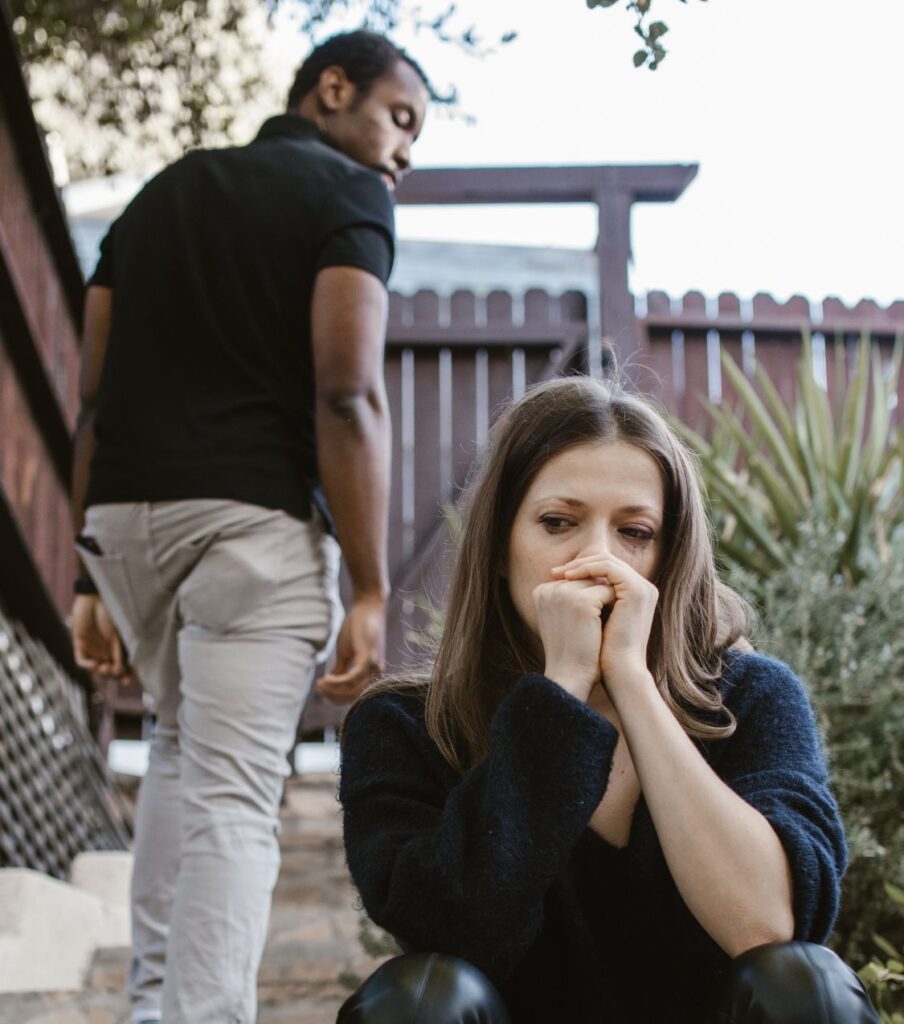Rebuilding trust after infidelity is crucial, yet many couples grapple with this challenge without full remorse from the unfaithful partner. This leads to an incredibly important and often devastating question: Can couples heal from infidelity when the unfaithful partner is not fully remorseful? In this article, we delve into this complex issue, offering insights, strategies, and hope for those navigating this difficult path.

Rebuilding trust without remorse seems counterintuitive. It is no secret that infidelity is one of the toughest challenges any relationship can face. It shakes the foundation of trust and leaves emotional scars that feel almost impossible to heal. So what happens when the partner who broke that trust isn’t showing the level of remorse you’d hoped for? Can the relationship still survive? More importantly, can it thrive?
In this post, I invited two of my amazing team members to help explore this issue. Dr. Yael Haklai-Neagu and Ana De la Cruz are both licensed marriage and family therapists at Relationship Experts. They work directly with our infidelity recovery coaching clients. With more than 20 years of experience between them, Dr. Yael and Ana bring a wealth of knowledge and practical insights to affair recovery.
Why Remorse Matters When It Comes to Trust After Infidelity
What is the role of remorse in the healing process? Why is it so crucial? What can you do if your partner isn’t fully there yet? Is rebuilding trust after infidelity without remorse possible? These are vital points to explore alongside ideas and strategies to help you navigate this challenging situation. The ultimate goal? To find a way forward that works for both of you.
What significant struggles get in the way of remorse?
In my work with couples managing the aftermath of infidelity, I’ve seen different struggles, particularly when it comes to showing genuine remorse.
- Many couples hit a point where their healing journey hinges on whether or not the unfaithful partner truly feels sorry.
- Sometimes, the unfaithful partner doesn’t feel any remorse at all. This can be a huge roadblock to healing because the hurt partner often feels invalidated and stuck in their pain. Without remorse, it’s incredibly hard to rebuild trust after infidelity and move forward.
- There are also situations where the unfaithful partner does feel remorse, but it’s not complete. For example, they might regret the pain they caused their partner but not necessarily the act of betrayal itself. This kind of partial remorse can send mixed signals, making it tough for the hurt partner to fully trust that their partner is sorry.
- Sometimes, remorse isn’t given the priority it deserves in the healing process. It can come across as forced or not genuine, which only adds to the hurt and confusion. Genuine remorse is such a key step in rebuilding trust after infidelity and creating a sense of safety in the relationship. But what about partial remorse? Is that enough? Is that workable? I want you to better understand what it means in your healing process.
I asked Dr. Yael for her insights, given her extensive experience working with couples dealing with infidelity.

Why Do Unfaithful Partners Have Difficulty Expressing Genuine Remorse?
Dr. Yael asserts that some unfaithful partners have problems expressing remorse for two key reasons:
1. They Do Not Feel Fully Remorseful
Some unfaithful partners express regret for hurting their partner but struggle to feel full remorse for their infidelity. This, of course, impacts their ability to offer a sincere apology. This happens when they believe their actions were somewhat justified. For example, she had clients who shared with her that they felt almost entitled to seek fulfillment or validation outside the relationship because of personal or relationship issues.

Yael also noted that some clients struggled to feel full remorse because they felt such anger or resentment toward their partner that it was difficult for them to genuinely express remorse. Though similar to feeling justified in their infidelity, the unfaithful partner’s unresolved anger interferes with their ability to feel empathy for their partner.
When unfaithful partners hold onto their pain and hurt, it is hard for them to express genuine remorse. Although it’s completely understandable, it hinders the healing process. Mistakenly, they believe they must first address pre-existing relationship issues before dealing with the cheating. In such situations, unfaithful partners often avoid expressing remorse altogether and fail to repair the damage infidelity caused.
I agree. Unfaithful partners often feel there was an unaddressed injustice in the relationship before the infidelity. Thus, cheating is somehow warranted in their mind. That mindset prevents them from being the supportive and remorseful partner their spouse needs them to be.
Moreover, Yael added, some clients (and even some couples therapists) mistakenly believe that resolving pre-existing relationship issues should come before, or even take priority, over addressing the aftermath of infidelity. This approach can be damaging to the healing process because it can make the infidelity seem justified or minimize its profound impact. This leaves the hurt partner feeling abandoned, unseen, or even pressured to move on from their pain and fix past issues while they are emotionally at their lowest.
This is so true. Many couples go to therapy after infidelity and are told to put the betrayal behind them, focusing instead on relationship issues. Of course, this first assumes that there were issues. Second, it assumes that these issues caused or led to the infidelity. The result? Too many hurt partners are left to feel vulnerable and doubt themselves.
2. They Are Locked In Shame
Many unfaithful partners are so consumed by shame and guilt that they struggle to face their partners, acknowledge their actions, and fully express remorse. Instead, they become unresponsive or defensive. When unfaithful partners are consumed by shame, Dr. Yael noted, they don’t believe in their ability to help their partner, or they don’t recognize how desperately their partners need them to help them heal.
Relationship experts see this all the time. Shame is a significant issue when it comes to trust after infidelity. I then asked expert Ana de la Cruz to share her thoughts and experiences regarding unexpressed remorse and the unfaithful partner.
Are There Other Reasons Unfaithful Partners Struggle To Express Remorse and Rebuild Trust After Infidelity?
Based on her experiences with couples, Ana believes there may be another factor to consider:
3. They Just Want To Move On
Unfaithful partners often want to quickly move forward or “flip the page,” immediately starting a new chapter in the marriage. To do anything else feels like staying stuck in the crisis or regressing. Why?
- Reflecting on past actions can make the unfaithful partner hesitant to revisit painful memories. It is important to acknowledge that the unfaithful partner is also in a turmoil of emotions, struggling with shame, anger, and guilt. Ana shared that one of her clients said expressing remorse was like going back to the revelation day. Expressing remorse evoked the same level of anxiety and horror as the day they admitted everything to their partner. So, they press forward unproductively, making attempts to rebuild trust without remorse.
- The desire to move forward quickly may be based on an urgent need to address and resolve pre-existing issues within the relationship.
- Sometimes, this is helpful: the unfaithful partner can make sense of what they did. They pick up the pieces and gain an understanding of their actions. This allows them to manage their level of shame. They might say, “I did this because of that,” or “I am not a bad person; there were problems in our relationship, and that’s why I was unfaithful.”
- Sometimes, a hurt partner’s hard push to understand WHY ( “Why did you do this?”) is misinterpreted. While the why question is absolutely normal, the unfaithful partner might interpret this as, “Let’s address all the issues in our relationship before the infidelity.” Obviously, this can distract from the present pain and devastation of the infidelity on the hurt partner.

I asked Ana if she could recall any real-life examples of a couple dealing with this. She shared the following:
An unfaithful wife was profoundly remorseful for hurting her husband. Yet, despite her remorse, she held deep anger towards him. For years, she felt abandoned in the relationship. Her affair had provided the companionship and validation she desperately needed. In her view, her husband’s emotional neglect pushed her to seek comfort outside of their marriage. Those feelings blocked her ability to fully express remorse.
On the other hand, her husband was devastated and overwhelmed by pain and betrayal. His wife’s anger and her perspective on the affair added layers to their healing process. While she was truly sorry for the hurt she caused, she was also grappling with the pain from unresolved issues in their relationship, which, to her, had led to infidelity. There was a huge need for, “You need to see me too.” Ana believes this situation illustrates how crucial it is to recognize and validate such complex emotions.
So, now that we understand the key reasons unfaithful partners might not fully feel remorseful, the next question is whether this is something that can be worked through.
How Do Couples Facing Challenges With Remorse Heal And Rebuild Trust After Infidelity?
I asked Dr. Yael how she helps a couple when the unfaithful partner says they’re partially remorseful or feels remorse but isn’t interested in expressing it. Yael shared that she takes the following approach:
1. Understand where the unfaithful partner’s reluctance is coming from.
Is it due to anger, resentment, entitlement, shame, or something else? If someone isn’t fully remorseful, we’ll discuss what led them to choose infidelity over other ways to address their unhappiness. Often, this stems from a desire to please or avoid conflict.
It’s important to recognize that nothing justifies infidelity. Even if it seemed justified at the time, looking back, most people realize they could have chosen different paths, and that’s when genuine remorse often kicks in.
- Explain the common mistake of addressing pre-existing relationship issues before focusing on the magnitude of the infidelity.
2. Explain the common mistake of addressing pre-existing relationship issues before focusing on the magnitude of the infidelity.
Prioritizing processing the infidelity and expressing genuine remorse is essential for healing. Skipping this step can damage the healing process. Discovering infidelity is a traumatic event that shatters the reality of the hurt partner. In this mental and emotional state, it’s almost impossible for the hurt partner to explore pre-infidelity issues.

By first addressing the hurt partner’s pain due to the betrayal, we can create a foundation for genuine healing and understanding. Once the hurt partner feels heard and their pain is acknowledged and validated, they slowly gain the emotional capacity to attend to pre-infidelity issues and invest in repair.
I agree. Consider an example in friendship:
Imagine you’ve been good friends with someone for years, but lately, you’ve been super busy with life, work, and kids, so you haven’t spoken much. One day, you discover this friend had a huge birthday party. Everyone was invited, including all your mutual friends, but not you. You call your friend and tell them you’re deeply hurt, but they keep explaining that it’s because you haven’t been in touch lately.
Their explanation doesn’t make you feel any better. That’s because no remorse was expressed. Your friend thought highlighting the reason would make you feel better, but in reality, we need to hear the remorse first. Only after we feel genuine remorse can we then be open to hearing the justification.
How Can Unfaithful Partners Understand Their Role in Healing and Rebuild Trust After Infidelity?
Dr. Yael recognizes that, often, unfaithful partners don’t fully understand their profound role in the healing process. They don’t realize the importance of expressing remorse before addressing general relationship issues. Thus, they struggle to embrace the mindset of genuine remorse/empathy.
Metaphors Make A Difference
Yael always looks for ways to help clients connect with and relate to the concepts she introduces. Metaphors or analogies are her preferred approach as they evoke emotions and help clients connect with ideas deeply and can even shift their mindset.
If you are an unfaithful partner who struggles to express remorse, the following analogy may help you:
Imagine your partner drowning in a deep, stormy ocean, fighting high waves, swallowing water, and crying for help. You’re standing on the dock, knowing that you pushed your partner into the deep water, but you’re overwhelmed by shame, or holding on to some anger, resentment, or sense of entitlement.
You pace back and forth on the dock, saying, “Oh my God, I can’t believe I pushed them! I can’t bear to see them drowning.” Sometimes, you leave the dock because you can’t even face the sight or sound of their struggle. Or you stand there, upset about what led you to push your partner into the water in the first place. Sometimes, you might even think there are some justified reasons for them to be in the water… Meanwhile, your partner is drowning, fighting the waves, crying for help.
Instead of standing on the dock:
The first thing you must do is jump into the water, save your partner, and help them stabilize from the overwhelming and scary experience of drowning. Before anything else, you must jump into the water and get them out.
Yael developed this analogy, personalizing it on a case-by-case basis, during her work with unfaithful partners who struggle to show up for their partners. She encourages them to “jump into the water.” Many clients have shared that this analogy is a game-changer, marking a turning point in understanding their role in the healing process. It has enabled them to express genuine remorse and show up more effectively for their partners.

Ana’s Couple Benefited from the Metaphor Technique
Getting back to the couple Ana mentioned earlier, I wondered how she helped them work through remorse and ongoing disconnect.
As mentioned earlier, the husband, who was deeply hurt, desperately needed to hear genuine remorse from his wife. She was remorseful for hurting him but also angry and believed his neglect in the marriage pushed her to have an affair. Their conversations often spiraled into arguments about who was more at fault, which wasn’t helping either of them.
The wife felt abandoned, and the affair had provided the companionship she was missing. There was a lot of resentment. She was stuck in a cycle of guilt, saying, “I’m sorry for hurting you, but you need to see what you did that led me there.” He wasn’t ready to hear that; he was overwhelmed by pain and betrayal.
When Ana heard this metaphor from Dr. Yael –
It instantly resonated with her. While working with her couple, she personalized the metaphor to perfectly align with their need at that moment, ensuring that it was something that they could picture. They had mentioned at some point that they lived near a lake and that the waters were very dark, so she used this information to create the analogy.
To shift the wife’s perspective, Ana asked her to close her eyes and imagine both of them walking next to a dark lake. She asked her to picture him saying things that upset her, leading her to push him into the lake without much thought. Ana then asked, “He’s drowning and can’t swim. What do you want to do right now?” The wife immediately said, “I want to pull him out and then tell him why I pushed him.” Ana responded, “Perfect, let’s do that. Let’s pull him out first, and then we’ll talk about why you pushed him.”
It was a total breakthrough.
This metaphor allowed them to focus on the husband’s immediate pain. He expressed how deeply hurt he was by the betrayal. She was able to express genuine remorse, love, and reassurance. This moment of empathy and understanding led to something beautiful. He began to acknowledge the gaps in the relationship where he had neglected her, taking full responsibility for his own actions just as she did for hers.
Healing began.
They both felt seen and heard by each other. By the end of the program, they expressed how impactful and important this analogy was for them, shifting their mindset regarding the order in which things needed to be addressed. This couple rebuilt Trust after infidelity and went on to build a beautiful relationship together. They are very happy now, and everyone around them has noticed. The last thing I heard from them was that one of their children said, “What has gotten into you two? You’re so lovey-dovey. Get a room!” That was music to their ears.
Ana remarked that their transformation was truly remarkable. It’s very inspiring to see how couples can overcome challenges, heal deep wounds, and ultimately thrive in their relationships. This is the art of therapy—being able to lean on science while artfully understanding complex relational situations to help couples see things differently, rebuild trust after infidelity, and make meaningful shifts.
The Takeaways: Why Rebuilding Trust Without Remorse Is Not Ideal But It’s Also Not A Deal Breaker:
Takeaway #1: if your partner doesn’t feel fully remorseful, or if you are the betraying partner and you feel only partially remorseful, you can work on this. However, you will need help. This is a complex situation that requires extra steps to
- unpack the remorse or lack thereof,
- understand the meaning of the infidelity to the unfaithful partner,
- and create a roadmap to healing that facilitates these conversations.
This is something we often do with couples in our infidelity recovery program. If this resonates with you, we invite you to reach out.
Takeaway #2: Healing after infidelity requires first addressing the damage caused by the infidelity itself, which involves expressing genuine remorse. Only later in the process can both partners attend to pre-existing relationship issues. This process requires empathy and patience.
Takeaway #3: recognize that both partners are often dealing with their own emotional turmoil—shame, guilt, anger, and pain. Healing requires patience, empathy, and understanding of each other’s perspective. By validating these emotions and addressing the underlying issues in an orderly fashion, couples can find a path to genuine healing and rebuild a stronger, more loving relationship. Approach your relationships with more compassion and openness, knowing that even in the most challenging times, transformation and growth are possible.
Please take these insights from our team and allow them to inspire you. You are worthy of love, forgiveness, and the beautiful possibility of a brighter tomorrow. No matter what you face in your relationships, there is always hope for healing and growth.
THE BOTTOM LINE? YOU CAN LEARN HOW TO REBUILD TRUST AFTER INFIDELITY RECOVERY IN MIAMI, FL.
Our team at Relationship Experts is available and extraordinarily capable. We are here to guide and empower your affair recovery. We offer the expertise, programs, and care you need. Please look into our online support when you’re ready.
Our infidelity recovery coaching program is a valuable investment of your time and energy.
Reach out right away to connect and get immediately:
- Plan your free 45-minute consult.
- Share with one of our program specialists. Talk together about our Affair Recovery Program.
- Begin learning about making an apology after cheating and infidelity recovery now!
MORE CHOICES FOR HEALING FROM RELATIONSHIP EXPERTS
Our staff at Relationship Experts encourages mental and emotional recovery while supporting healed personal connections. Our private practice is located in the United States, serving clients in Miami, Florida. If you are located elsewhere, please view more help available online in the US, UK, and Canada. Read more on our blog page.
Comments +